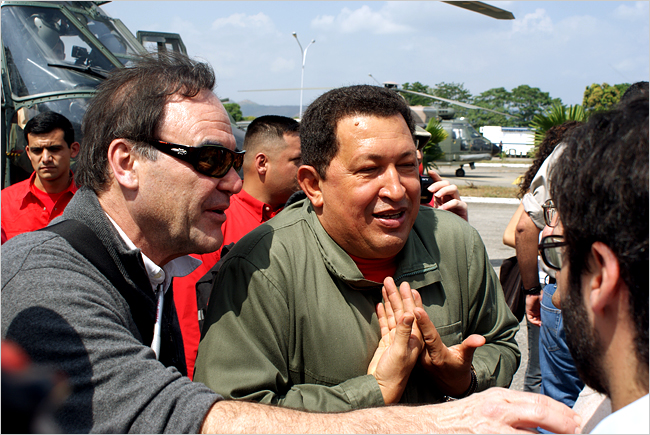|
Reviews of Recent Independent, Foreign, & Documentary Films in Theaters and DVD/Home Video

SOUTH OF THE BORDER Whether he’s first a political thinker, and second a filmmaker—or the other way around—seems more like an internal conflict for Oliver Stone rather than a discussion worth having here, but nonetheless one often wonders at his motivations. Especially upon seeing South of the Border, an interview documentary on the spectrum-left leaders of several South American countries and the recent political history that has given them their populist mandate. Stone’s access to these heads of state is comprehensive, in particular the weekend-long interview with Hugo Chávez, as well as private meetings with six other sitting presidents. The director conducts the interviews himself, buddying up with all of his subjects, including Chávez, Bolivia’s Evo Morales (with whom he kicks around a soccer ball), the Kirchners of Argentina, Paraguay’s Fernando Lugo, Lula da Silva from Brazil, Raul Castro, and Rafael Correa of Ecuador. Missing are the decidedly America-friendly Álvaro Uribe and Alan García of Colombia and Peru, respectively. In a lineup like this, it’s more about who isn’t interviewed than who is. Stone allows each president an opportunity to describe him- or herself as the reformer he/she aspires to be, something the American news media, he points out, never does. It’s a kind of “Chávez on Chávez,” “Kirschner on Kirschner,” and so on, but Stone’s point is a salient one: the American corporate media has an interest in opposition to these nationalist movements. To be clear, though, we’re not talking about Nicaragua of ’54, or Chile of ’73, of which Stone is careful to include mentions. Governments aren’t being overthrown here, but the usual asymmetrical economic pressure is apparent—the United States (at least as representative of the dominant global economy) and its undue influence on its poorer southern neighbors. As several of these presidents point out, none as eloquently as Mr. Correa, it’s unthinkable to deviate from the U.S. economic model, and to do so invites aggression. The policies enacted by Chávez, Morales, and by each of these presidents to a certain extent, position them as renegades in the eyes of the greater corporate interests in the U.S., and therefore in the press as well. “Knowing the American media,” says Correa, “I would be more worried if they spoke well of me.” Stone’s identity complex is still at stake, though. His earlier films pose him as something of a conspiracy theorist, and in South of the Border, that quality shines through. “See,” Stone, reacting to the criticism, seems to be saying, “I’m still a political thinker, whether or not you thought Alexander was a sell-out moment or W. a confused piece of hype.” For some
reason, Stone’s grandiose narration finally employs a vague Old Man
and the Sea metaphor: the struggles of the global south against the
unrelenting elements of capitalist sharks (or some similar stretch). If
this is because Hemingway did much of his writing in Cuba and Stone was
looking for the perfect segue, I can’t be sure. I do know that it
doesn’t work. Neither does the Cuba political tie-in, as leftists often
find to be the case when searching for an alternative to the U.S. model.
The Castro regime, carried on by younger brother Raul, is a far cry from
the democracies of even the most “socialized” South American nations
(Venezuela). Cuba is a country with an extremely unique history, and one
with as many negatives as positives. Tying six separate nations together
in leftist solidarity (especially ones espousing such strong nationalist
sentiment) is tough enough, but actually makes some sense in South
America, where there also exists a continental identity. But Cuba is and
always has been the wild card, and it’ll take more than even an Oliver
Stone film to change that perception.
Michael Lee
|

